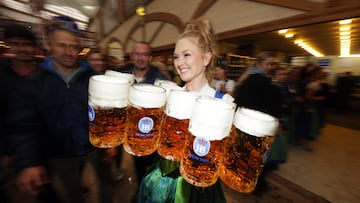Oktoberfest 2025 is over, but on this date, October 12, in 1810 is when it began in Munich
Munich’s two-week celebration started out as a party to mark a royal wedding. Today, it attracts 7 million visitors with 6.5 million liters guzzled.

Last orders was called October 4 at noon, as the last beer was pulled and the gunshots rang out from the foot of the Bavaria statue. Oktoberfest is over, until next year, when the beer tents will reopen along the Theresienwiese - an event which has been held for almost two centuries and regularly attracts around seven million visitors.
There is a lot more to Oktoberfest than just drinking beer. Away from the carnival rides, and food stalls on the main drag, there’s plenty to see and do in Munich. The figures show just how popular the event has become - a street party that continues to grow every year.
AFP’s Alexandra Beier photographs celebrations in the Hofbrau tent on the last day of the world's largest beer festival, Oktoberfest, in Munich, Germany.
— AFP News Agency (@AFP) October 6, 2025
6.5 million visitors attended the Oktoberfest over the 16 days, drinking 6.5 million litres of beer pic.twitter.com/eXdcdlBgBg
The origins of Oktoberfest
Oktoberfest dates back to 1810, when Crown Prince Ludwig (later King Ludwig I of Bavaria) married Princess Therese of Saxony-Hildburghausen. Wanting to mark the occasion with something special, Andreas Michael Dall’Armi, a member of the Bavarian National Guard, proposed a public celebration featuring a grand horse race.
The wedding took place on October 12, and just five days later, on October 17, Munich’s citizens gathered for a massive festival held on the fields just outside the city gates. Those grounds were later named Theresienwiese in honor of the princess.
The people of Munich had so much fun, they wanted to do it all again the following year. In response, the Bavarian Agricultural Association stepped in to organize the second edition, and made the most of it to showcase local products and traditions.
The world's largest folk festival takes place in Munich every year, attracting 6-7m visitors.
— German Embassy London (@GermanEmbassy) September 19, 2025
Oktoberfest opens its doors on Saturday.
The origins go back to 1810, when the marriage of Bavarian Prince Ludwig I & Princess Therese of Saxe-Hildburghausen was celebrated. pic.twitter.com/Q3zUhgCskU
War brings the festivities to a halt
The festival was canceled for the first time in 1813 due to the Napoleonic Wars. For several years afterward, Oktoberfest was privately funded until 1819, when the city officially adopted it as an annual event, recognizing its potential to draw huge crowds, both locals and visitors, and generate significant revenue.
In 1850, the celebration took on new meaning. Bavaria - a towering bronze sand-cast statue of a female figure hand aloft clutching a wreath of oak leaves, was unveiled next to the Ruhmeshalle overlooking Theresienwiese.
The next few decades were turbulent: the Austro-Prussian War forced the festival to be cancelled several times, and a cholera outbreak pulled the plug on the 1873 edition.
#Oktoberfest first took place #onthisday in 1810. These lavishly decorated beer tankards are from Germany. Prost!🍻 https://t.co/oaxP3ESeXi pic.twitter.com/YZv4Z6jyGZ
— British Museum (@britishmuseum) October 12, 2016
By the late 19th century, Oktoberfest had evolved into a full-blown fair, complete with massive beer tents, traditional Bavarian live music, fun fair rides...
In 2010, Oktoberfest celebrated its 200th anniversary with a special commemorative festival on the southern end of Theresienwiese. The event featured cultural exhibits, family-friendly programming, and horse races—paying tribute to the original celebration. The Oide Wiesn (Old Oktoberfest) was such a hit that it was held annually until 2016, with the return of the Bavarian Agricultural Fair. The Oide Wiesn was back in 2024 when the Bayerische Zentral-Landwirtschaftsfest (ZLF), which is celebrated every four years, was cancelled.
Loved Oktoberfest 2025 with Kate and the team! 🍻
— Harry Kane (@HKane) October 5, 2025
Perfect finish to the week 🙌 pic.twitter.com/qOFIbHqJtZ
When is Oktoberfest 2026?
The next Oktoberfest, the 191st edition, will take place from September 19 to October 4 2026. Mark the date in your diary!
Related stories
Get your game on! Whether you’re into NFL touchdowns, NBA buzzer-beaters, world-class soccer goals, or MLB home runs, our app has it all.
Dive into live coverage, expert insights, breaking news, exclusive videos, and more – plus, stay updated on the latest in current affairs and entertainment. Download now for all-access coverage, right at your fingertips – anytime, anywhere.
Complete your personal details to comment